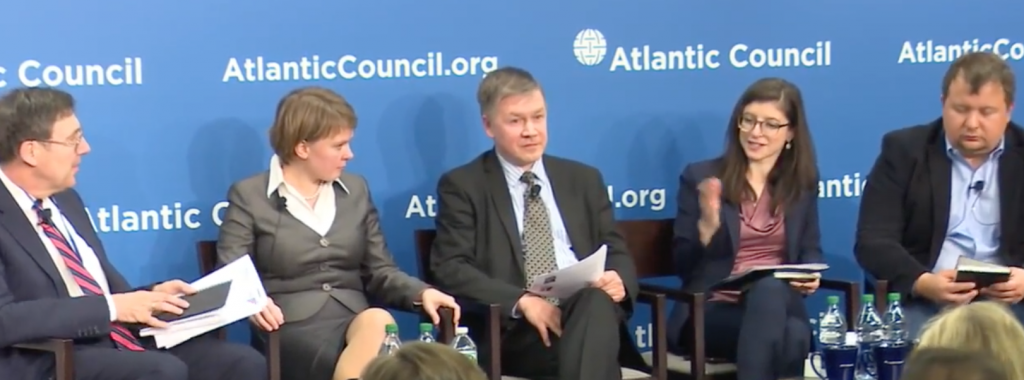On March 7th, 2016 The Atlantic Council set a panel to discuss the Russian diaspora and the reasons for why it has been increasing over the years.
Panelists: Ms. Evgenia Chirikova (Environmentalist Russia) Mr. Mikhail Kokorich (President and Co-Founder, Astro Digital Inc., Partner Space Venture Fund) Dr. Sergei Erofeev (Consultant, Rutgers University) Dr. Alina Polyakova (Director of Research, Dinu Patriciu Eurasia Center and the Future Europe Initiative, Atlantic Council)
Moderated by: Ambassador John Herbs (Director, Dinu Patriciu Eurasia Center, Atlantic Council)
Alina Polyakova states that many sectors in the US workforce are composed of Russian speaker. An example of this would be the tech industry which has an increased number of Russian speakers. There are more and more people immigrating from Russia, per say looking at the years 2000-2014 there were approximately 1.8 million people that left the motherland, increasing significantly particularly in 2012. The majority of citizens which left are highly skilled and exceedingly trained individuals, and it could be seen as the number one threat to the Russian Federation.
Evgenia Chirikova sustains that there is a problem with the Kremlin and the KGB system. She believes that there is a need for European support, especially the vocal one. A problem in Russia is that there is no independent media. People do not have the freedom of speech. It is of utmost importance that the citizens are allowed and inspired to grow. Many individuals want to speak out, but because it is an unusual activity for Russia, the citizens need support. The process started in 2010, and now there are dozens of grassroots groups in Russia.
It was excellent that American Adapted Magnitsky Act. There is a need for the investigation to be aided. Western countries continue to import from Russia. Putin spends this money for wars, propaganda and aggressive repression against Russian civil society. The speaker states that it is important for European and American societies to change the policies and use green energy so that they can stop buying oil and gas from this authoritarian regime. There were a lot of political activists who left after 2012 because they debated unfair, corrupt elections. It was for their safety that they had to move to Western countries.
Mikhail Kokorich sustains that entrepreneurs coming from Russia retain their connections with the homeland. They are employing Russians back in the state. The high-tech engineers in Belorussia are working for companies founded by Russian-speaking entrepreneurs. They are making software for BMW, Mercedes, etc. Their abilities are coming from Russian countries. Small businesses are remotely working with small teams.
Dr. Sergei underlines that the particular traits of people coming out of Russia to settle elsewhere, and there is the publication of data. Many people have diagrams which show that migration rates have gigantically dropped at the beginning of Putin’s reign but they started to rise again in 2010. The critical approach is that the numbers are not as important but the quality.
It is not just the political system that is pushing people outside of the country. There was growth in Russian economy before 2010. In 1999 national retail in Russia was unbelievable. Production of consumer goods only imported. Russia is one of the largest exporters of goods today. The whole economy was created during that period. Once the economy crashed, entrepreneurs had to look for new avenues. The oil market has changed.
Synthesis by: Patricia Besciu – all opinions are those of speakers, no personal ideas included
For more information, visit: http://www.atlanticcouncil.org/events/webcasts/the-putin-exodus-the-new-russian-brain-drain
